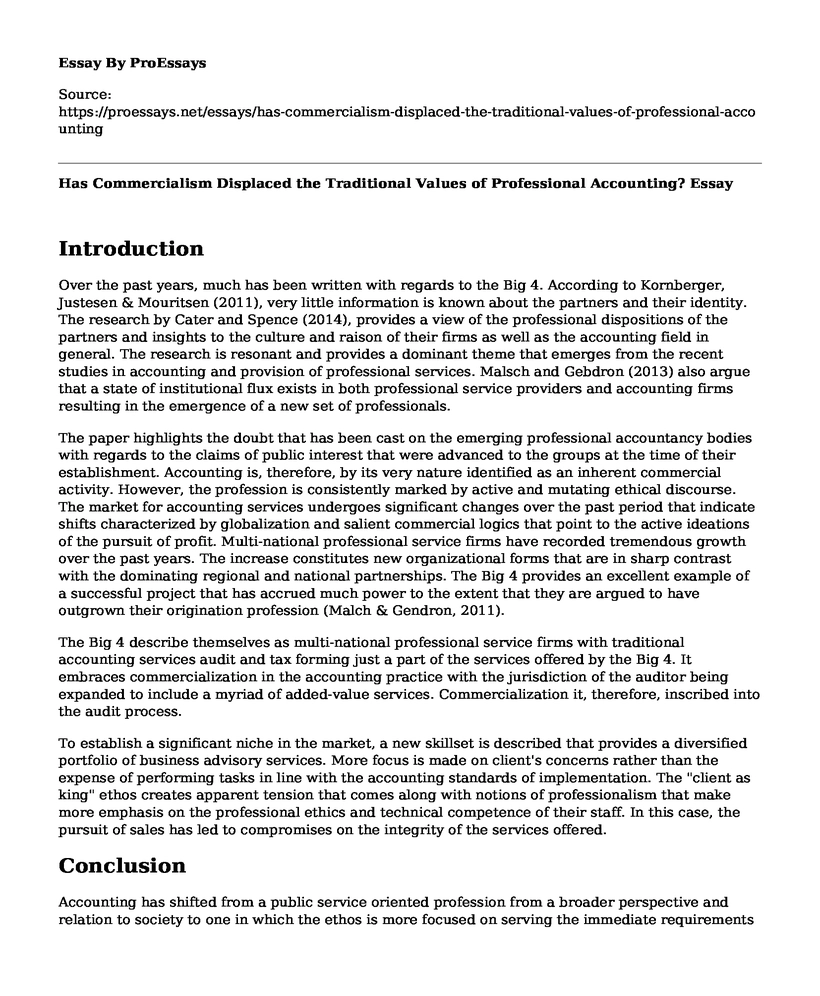Introduction
Over the past years, much has been written with regards to the Big 4. According to Kornberger, Justesen & Mouritsen (2011), very little information is known about the partners and their identity. The research by Cater and Spence (2014), provides a view of the professional dispositions of the partners and insights to the culture and raison of their firms as well as the accounting field in general. The research is resonant and provides a dominant theme that emerges from the recent studies in accounting and provision of professional services. Malsch and Gebdron (2013) also argue that a state of institutional flux exists in both professional service providers and accounting firms resulting in the emergence of a new set of professionals.
The paper highlights the doubt that has been cast on the emerging professional accountancy bodies with regards to the claims of public interest that were advanced to the groups at the time of their establishment. Accounting is, therefore, by its very nature identified as an inherent commercial activity. However, the profession is consistently marked by active and mutating ethical discourse. The market for accounting services undergoes significant changes over the past period that indicate shifts characterized by globalization and salient commercial logics that point to the active ideations of the pursuit of profit. Multi-national professional service firms have recorded tremendous growth over the past years. The increase constitutes new organizational forms that are in sharp contrast with the dominating regional and national partnerships. The Big 4 provides an excellent example of a successful project that has accrued much power to the extent that they are argued to have outgrown their origination profession (Malch & Gendron, 2011).
The Big 4 describe themselves as multi-national professional service firms with traditional accounting services audit and tax forming just a part of the services offered by the Big 4. It embraces commercialization in the accounting practice with the jurisdiction of the auditor being expanded to include a myriad of added-value services. Commercialization it, therefore, inscribed into the audit process.
To establish a significant niche in the market, a new skillset is described that provides a diversified portfolio of business advisory services. More focus is made on client's concerns rather than the expense of performing tasks in line with the accounting standards of implementation. The "client as king" ethos creates apparent tension that comes along with notions of professionalism that make more emphasis on the professional ethics and technical competence of their staff. In this case, the pursuit of sales has led to compromises on the integrity of the services offered.
Conclusion
Accounting has shifted from a public service oriented profession from a broader perspective and relation to society to one in which the ethos is more focused on serving the immediate requirements of senior executives of the audited organizations. However, despite the fact that commercial logics have transformed professional accounting, commercialism has not yet wholly overruled the traditional values of collegiality, integrity and due process. The values that associate with the ideal-type of professional logics go far beyond the introduction of commercial logics and establish a deep structure that forms part of professional accounting. However, professional service firms are likely to be rooted in different values and orientations.
References
Carter, C., & Spence, C. (2014). Being a Successful Professional: An Exploration of Who Makes Partner in the Big 4. Chicago.
Cite this page
Has Commercialism Displaced the Traditional Values of Professional Accounting?. (2022, May 22). Retrieved from https://proessays.net/essays/has-commercialism-displaced-the-traditional-values-of-professional-accounting
If you are the original author of this essay and no longer wish to have it published on the ProEssays website, please click below to request its removal:
- Accounting: Assignment Example
- Research Paper on Financial Accounting Theory
- Auditing-Internal Control - Essay Sample
- The Significance Quest Theory & Sexism: Unveiling the Causes of Gender Prejudice
- Technology Transforming Human Life: Impact on Film and Social Media
- Essay Sample on FASB: Establishing Uniform Accounting Standards Since the 1920s
- A Response Paper







